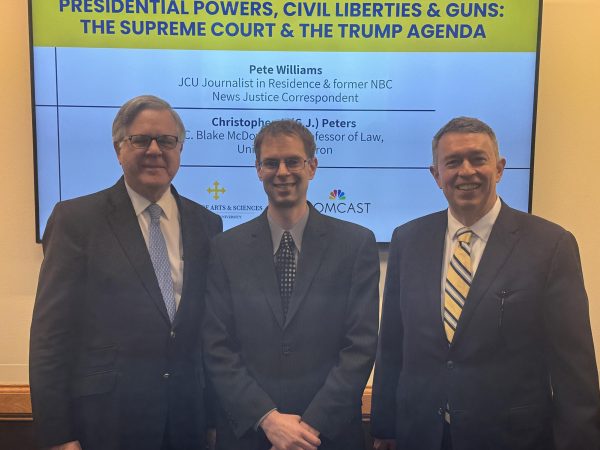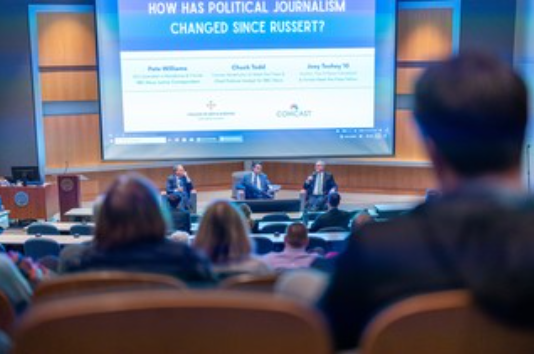Nearly two decades after iconic newsman Tim Russert’s passing, three prominent journalists, Pete Williams, Chuck Todd and Joe Toohey ‘10, sat down for a candid conversation about how political journalism has evolved since Russert’s era. Their discussion, hosted at a panel event at John Carroll University’s Donahue Auditorium, served not only as a tribute to Russert’s legacy but also as a thoughtful examination of the shifting media landscape in an age of polarization, social media and real-time news.
Each of the three panelists brought a distinct generational perspective to the table. Pete Williams, the longtime NBC News Justice Department correspondent and a contemporary of Russert’s, offered reflections from the era when journalism was defined by rigorous reporting and trust in institutions. Chuck Todd, Williams’ direct successor as host of “Meet the Press,” spoke from his experience navigating the show’s transition during the early days of digital disruption. Joe Toohey, an anchor from WJW FOX 8 News, moderated the event.
Together, they painted a picture of an industry transformed, both enriched and challenged since Russert died in 2008. Opening the conversation, Pete Williams acknowledged the loss of a shared civic dialogue that was once fostered by programs like “Meet the Press” under Russert’s stewardship.
“Tim had this unique ability to bring the country together around the same set of facts and issues,” Williams said. “When he asked a question, people from all walks of life tuned in. Today, we’re watching different shows, reading different websites and getting our news in very different ways.”
Williams emphasized how journalists in Russert’s generation often operated under the assumption of a shared public mission: to inform, to explain and to hold the powerful accountable. “That mission,” Williams said, “remains…but the tools and the terrain have changed.”
Chuck Todd, who took over “Meet the Press,” in 2014 reflected on the immense pressure to maintain the show’s authority while facing the realities of a digital-first audience. “In the past, there used to be two television sets and a radio in the house. Now, kids don’t even really watch TV or listen to the radio. It’s a lot of scrolling and ‘TikTokization,’” Todd said.
He also commented on the rise of partisan echo chambers. “Today, there are news outlets like the AP not allowed in the White House Briefing Room. That is the same for NBC in the Pentagon. My personal opinion is that no news organization should be in the room until the party in charge can make it fair to everyone.” Still, Todd expressed hope. “Journalists are needed more than ever in today’s society. There is so much going on and so much news and information.”
Joe Toohey, representing a newer generation of reporters, spoke about the evolving expectations of audiences, especially at the local level. “As a journalist, you have to be mutual when it comes to reporting. Everything has to be fact-based.”
Throughout the discussion, all three journalists returned repeatedly to the qualities that defined Russert’s journalism: preparation, fairness, curiosity and respect for the viewer. Toohey added, “If there’s one lesson from Tim Russert that still holds from my fellowship, it’s ‘Do your homework.’ That’s a standard we can still uphold, even in a TikTok world.”
The panel ended with a note of cautious optimism. Despite the challenges facing political journalism—from misinformation to audience mistrust—each panelist expressed a belief that the core mission remains unchanged. Pete Williams closed the conversation with a reflection on legacy: “Anyone can post anything without fear or legal liability.”
As political journalism continues to evolve in a landscape dominated by digital disruption and partisan noise, the legacy of Tim Russert offers a lodestar: journalism rooted in preparation, accountability, and public service. The reflections of Williams, Todd and Toohey underscore a central truth—though the media world may look very different than it did in 2008, the principles that defined Russert’s work remain as vital today as ever.

Another event during the week included the JCU College of Arts and Sciences hosting a thought-provoking event titled “Presidential Powers, Civil Liberties & Guns: The Supreme Court and the Trump Agenda.” The discussion featured Pete Williams and Christopher (C.J.) Powers, a constitutional law expert from the University of Akron. Moderated by John Carroll University’s own Colin Swearingen, who holds a Ph.D. in political science, the conversation explored the balance of power between the executive branch and the judiciary, with a special focus on how recent and upcoming Supreme Court decisions may shape the legacy of President Donald Trump.
But, in a time of uncertainty and division, the call is not to return to the past but to channel its best traditions forward—to ask the tough questions, seek the truth and earn the public’s trust, one interview at a time.


